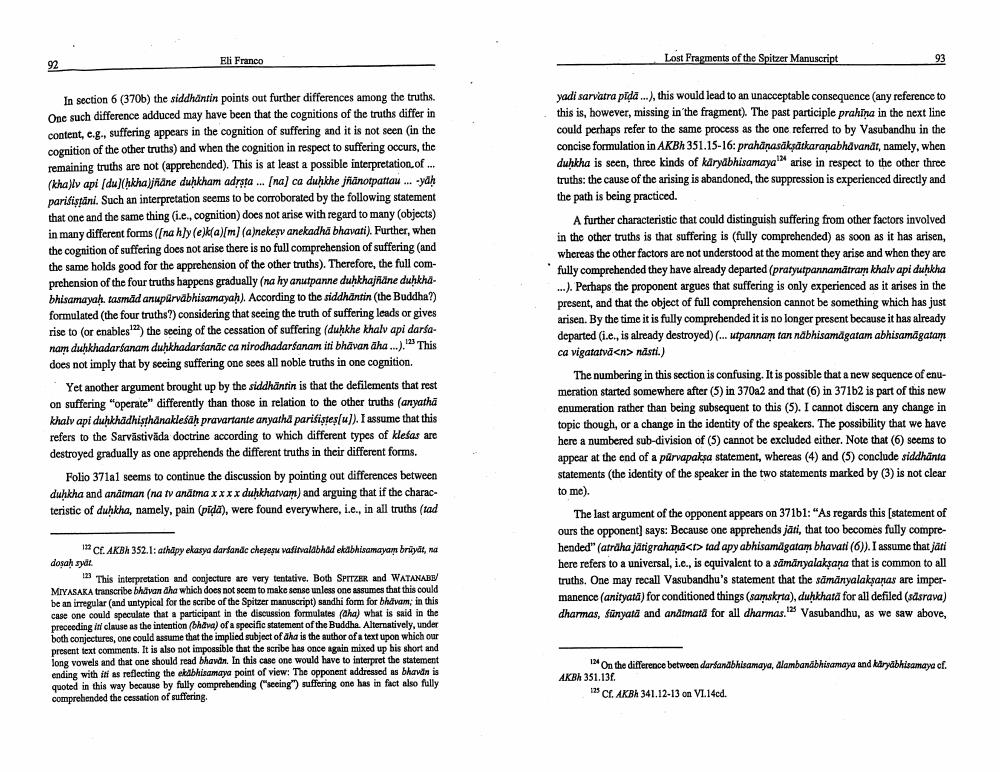Book Title: Lost Fragments Of Spitzer Manuscript Author(s): Eli Franco Publisher: Eli Franco View full book textPage 9
________________ 92 Eli Franco In section 6 (370b) the siddhantin points out further differences among the truths. One such difference adduced may have been that the cognitions of the truths differ in content, e.g., suffering appears in the cognition of suffering and it is not seen (in the cognition of the other truths) and when the cognition in respect to suffering occurs, the remaining truths are not (apprehended). This is at least a possible interpretation of ... (kha)lv api [du](ḥkha)jñäne duḥkham adṛṣṭa... [na] ca duḥkhe jñānotpattau... -yaḥ parisistäni. Such an interpretation seems to be corroborated by the following statement that one and the same thing (i.e., cognition) does not arise with regard to many (objects) in many different forms ([na hly (e)k(a)[m] (a)nekeşv anekadha bhavati). Further, when the cognition of suffering does not arise there is no full comprehension of suffering (and the same holds good for the apprehension of the other truths). Therefore, the full comprehension of the four truths happens gradually (na hy anutpanne duḥkhajñäne duḥkhäbhisamayaḥ, tasmād anuparvabhisamayaḥ). According to the siddhantin (the Buddha?) formulated (the four truths?) considering that seeing the truth of suffering leads or gives rise to (or enables122) the seeing of the cessation of suffering (duḥkhe khalv api darsanam duḥkhadarsanam duḥkhadarśanac ca nirodhadarsanam iti bhavan äha...). This does not imply that by seeing suffering one sees all noble truths in one cognition. 123 Yet another argument brought up by the siddhantin is that the defilements that rest on suffering "operate" differently than those in relation to the other truths (anyatha khalv api duḥkhadhisthänakleśaḥ pravartante anyatha parisișteș[u]). I assume that this refers to the Sarvästiväda doctrine according to which different types of klesas are destroyed gradually as one apprehends the different truths in their different forms. Folio 371a1 seems to continue the discussion by pointing out differences between duḥkha and anatman (na tv anatma xxxx duḥkhatvam) and arguing that if the characteristic of duḥkha, namely, pain (pīda), were found everywhere, i.e., in all truths (tad 112 Cf. AKBh 352.1: athapy ekasya dartanac cheşeşu vafitvaläbhād ekabhisamayam brāyāt, na dosal syst 123 This interpretation and conjecture are very tentative. Both SPITZER and WATANABB/ MIYASAKA transcribe bhavan dha which does not seem to make sense unless one assumes that this could be an irregular (and untypical for the scribe of the Spitzer manuscript) sandhi form for bhavam; in this case one could speculate that a participant in the discussion formulates (aha) what is said in the preceeding in clause as the intention (bhava) of a specific statement of the Buddha. Alternatively, under both conjectures, one could assume that the implied subject of aha is the author of a text upon which our present text comments. It is also not impossible that the scribe has once again mixed up his short and long vowels and that one should read bhavan. In this case one would have to interpret the statement ending with iti as reflecting the ekabhisamaya point of view: The opponent addressed as bhavan is quoted in this way because by fully comprehending ("seeing") suffering one has in fact also fully comprehended the cessation of suffering. Lost Fragments of the Spitzer Manuscript 93 yadi sarvatra pīḍā...), this would lead to an unacceptable consequence (any reference to this is, however, missing in 'the fragment). The past participle prahina in the next line could perhaps refer to the same process as the one referred to by Vasubandhu in the concise formulation in AKBh 351.15-16: prahāṇasākṣātkaraṇabhāvanät, namely, when duḥkha is seen, three kinds of käryäbhisamaya arise in respect to the other three truths: the cause of the arising is abandoned, the suppression is experienced directly and the path is being practiced. A further characteristic that could distinguish suffering from other factors involved in the other truths is that suffering is (fully comprehended) as soon as it has arisen, whereas the other factors are not understood at the moment they arise and when they are fully comprehended they have already departed (pratyutpannamatram khalv api duḥkha ...). Perhaps the proponent argues that suffering is only experienced as it arises in the present, and that the object of full comprehension cannot be something which has just arisen. By the time it is fully comprehended it is no longer present because it has already departed (i.e., is already destroyed) (... utpannam tan näbhisamägatam abhisamāgatam ca vigatatvä<n> nästi.) The numbering in this section is confusing. It is possible that a new sequence of enumeration started somewhere after (5) in 370a2 and that (6) in 371b2 is part of this new enumeration rather than being subsequent to this (5). I cannot discern any change in topic though, or a change in the identity of the speakers. The possibility that we have here a numbered sub-division of (5) cannot be excluded either. Note that (6) seems to appear at the end of a purvapakṣa statement, whereas (4) and (5) conclude siddhanta statements (the identity of the speaker in the two statements marked by (3) is not clear to me). The last argument of the opponent appears on 371b1: "As regards this [statement of ours the opponent) says: Because one apprehends jāti, that too becomes fully comprehended" (aträha jätigrahanä<t> tad apy abhisamägatam bhavati (6)). I assume that jäti here refers to a universal, i.e., is equivalent to a samanyalakṣaṇa that is common to all truths. One may recall Vasubandhu's statement that the samanyalakṣaṇas are impermanence (anityată) for conditioned things (samskṛta), duḥkhata for all defiled (sasrava) dharmas, sunyata and anätmata for all dharmas. 125 Vasubandhu, as we saw above, 124 On the difference between darfanabhisamaya, alambanābhisamaya and käryäbhisamaya cf. AKBh 351.13f. 125 Cf. AKBh 341.12-13 on VI.14cd.Page Navigation
1 ... 7 8 9 10 11 12 13 14 15 16 17 18
